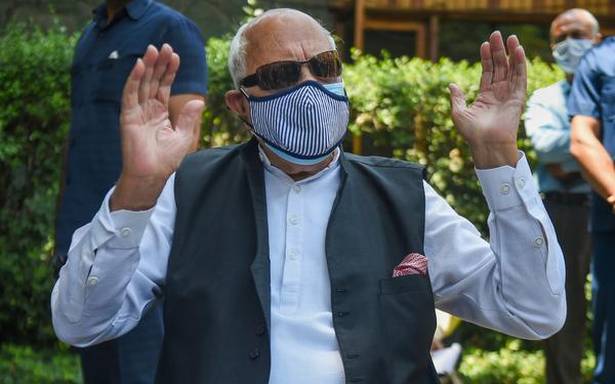National Conference president Farooq Abdullah pays tributes at the party office to the 22 Kashmiris who died during the anti-monarchy rebellion.
Jammu and Kashmir political parties, including the National Conference (NC) and the Peoples Democratic Party (PDP), on Tuesday alleged they were denied permission to pay tributes at the graveyard of the 22 Kashmiris who died during an anti-monarchy rebellion on July 13, 1931. Meanwhile, a shutdown affected normal life in the Valley.
“In view of the government-imposed restrictions, NC president Dr. Farooq Abdullah led party functionaries in paying glowing tributes and offering ‘fateh’ (prayers) to the July 13 martyrs at the party office, Nawa-e-Subah, this morning,” NC spokesman Imran Nabi Dar said.
In a joint statement, Dr. Abdullah and his son Omar Abdullah described the 1931 episode, which took place during the Dogra regime, as “a landmark in the history of J&K”.
“Their sacrifices resulted in the transformation of the State from a feudalistic to a democratic one. The brave men belonged to a generation of wisdom and vision. They saw in darkness and despair, a vision for the forthcoming generations; they envisioned a society free from bondage, discrimination and oppression,” they said.
The 1931 episode had seen the rise of the NC and its patron Sheikh Muhammad Abdullah on the political horizon of Jammu and Kashmir. Sheikh Abdullah’s granddaughter Nyla Ali Khan, who teaches in Oklahoma, U.S., said, “Sheikh sahib once said he felt as if the bullets were penetrating his heart. His political life in the real sense starts with this firing on the people. He said he was greatly influenced by this incident”.
PDP president Mehbooba Mufti, whose party was also denied permission to visit the graveyard in Srinagar’s Naqsband Sahib, said, “Today on the occasion of ‘Martyrs Day’, the gates leading to their graveyards have been locked up. Attempts to distort and rewrite Kashmir’s history is being done only to create a sense of defeat and helplessness amongst Kashmiris. Nevertheless, as we pay homage to the heroes of 13th July, 1931, our resolve to strive for restoration of J&K’s dignity remains firm.”
Sajad Lone’s Peoples Conference and J&K Apni Party also paid tributes to the anti-Dogra protesters. “They were the first torch-bearers for establishing democracy in this region,” Apni Party president Altaf Bukhari said.
Restrictions, shutdown in Valley
Meanwhile, parts of the old city, especially the roads leading to the graveyard, were blocked with concertina wires and barricades by the security forces.
Most shops and business establishments remained closed and there was skeletal traffic on the roads.
A shutdown call was issued by the separatists, including the Hurriyat headed by Mirwaiz Umar Farooq, on the occasion.
Till 2019, July 13 was being observed as ‘Martyrs Day’ and senior officials, including the Governor, police officers, and political parties, would offer their tributes at the graveyard. However, after the abrogation of J&K’s special constitutional position in August 2019, the Lieutenant Governor’s administration dropped July 13 from J&K’s official holiday calendar. Since then, no official visits the graveyard or issues any statement on the occasion.
Source: Read Full Article

